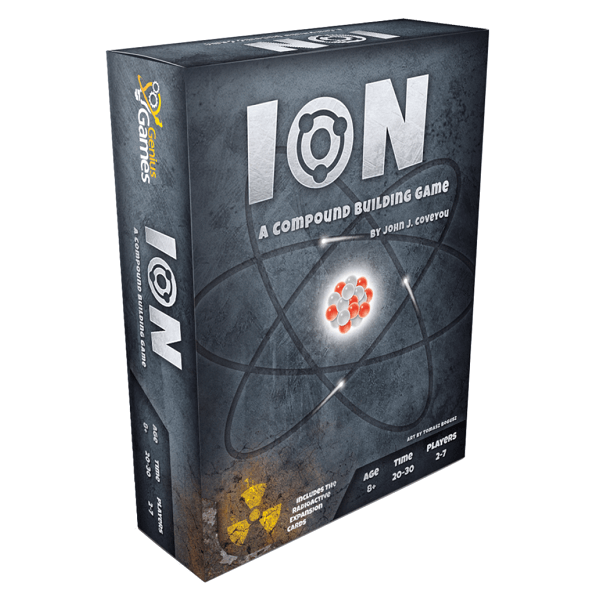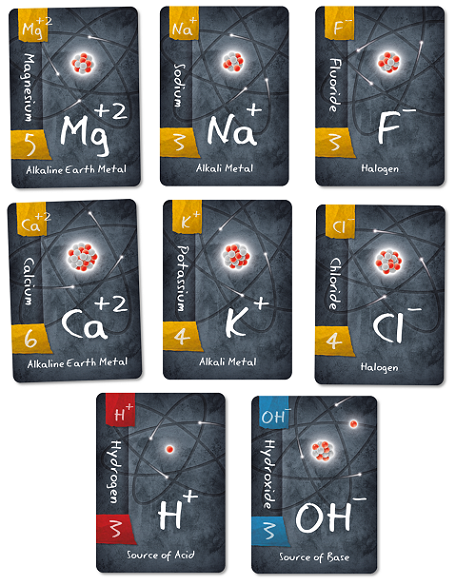Ion: A Compound Building Game

Ion is a card-drafting game about creating compounds and finding balance, published by Genius Games — a relatively new publisher that creates "chemistry and biology based games and children's books for both the gamer and scientist in everyone."
Many publishers have gone down the path of educational games, but usually they fall flat in terms of design and gameplay experience. Genius Games seems to have the visual quality of their games nailed down. But is Ion any fun?
Gameplay
Each player is given three action tiles which have a special ability on one side and a number on the other. They are then dealt eight cards. Four cards are placed face up in the center of the table with two goal cards near them (or three if playing with more than five players).
During a round, players simultaneously choose a card from their hand and place it face up in front of themselves, either on its own or paired with another card. Ion has a chemistry theme, so each card you draft is an ion with either a positive or negative charge. In order to score cards at the end of the round, you must group ions together so that their charges balance each other out. So if your compound has a card with a charge of plus two, you will have to pair it with two negatively charged cards. Once you have played a card you cannot separate it from an ion you’ve attached it to, or pair it with another card that you have already played. There are also Noble Gas cards in the deck which do not have to be paired with other cards but which are worth more points if you have different types.
After players have chosen a card from their hands, they pass their cards to the player on their left. Players then simultaneously choose a card from their new hand. The round continues until you only have two cards left in your hand which are then discarded. Next, you score your Noble Gases and any correctly balanced compounds, adding the point values shown on its ion cards. The goal cards also award you extra points if you managed to create the compounds shown on them. All cards are then picked up and reshuffled, new goal cards are drawn, and a new round begins.
During the game, players can use each of their action tiles once. These can let you draft two cards from a hand rather than one, take a card from the center of the table, or let you rearrange your ion cards and take unbalanced ion cards from a player after the drafting is complete. However, the number on each action tile is the number of points you will lose at the end of the game for having used it. These numbers range from two to four, and are random and kept hidden until you use them. So you’ll never be sure exactly how much it will cost you to use these abilities.
After three rounds, players calculate their final score and the player with the highest wins the game.

Review
Ion has a unique theme while also being a solid card-drafting game. The goal cards ensure that you’re going to have to make some tough decisions when passing cards along, because everyone is going to want those extra points. The action tiles are also a nice addition, adding just a dash of push-your-luck since you don’t know if that tile will lose you two points or four. Their abilities are powerful, but if you use all of them you’ll be out nine points so you have to use them wisely.
Outside of the goal cards, it doesn’t really make much difference which cards you use to balance each other out. This feels a bit like a missed opportunity and also means that sometimes it doesn’t matter that much which cards you choose to draft.
However the game comes with an expansion and a couple of different sets of cards you can choose to add if you want to change things around. Also, working with up to seven players, the game is pretty flexible for different group sizes.
There aren’t a lot of games out there with a similar theme and visually it is quite attractive to look at. If you enjoy card-drafting, this is one game you should definitely look into.
Pros: Flexible, unique theme
Cons: It sometimes doesn’t matter much which cards you pair together
Disclosure: we received a complimentary review copy of this game.







